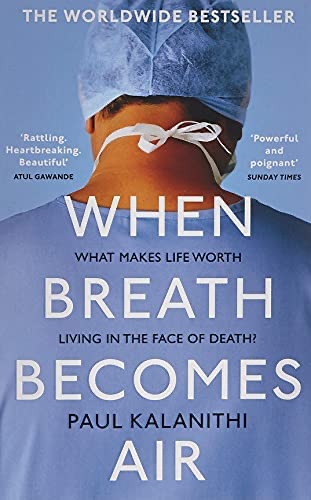
3 Sentence Summary
When Breath Becomes Air is a memoir by Paul Kalanithi that was published in 2016. The book tells the story of Kalanithi’s battle with cancer while working as a neurosurgeon. Through his unique perspective as both a medical professional and a patient, Kalanithi’s meditations in the book impart deep insights about life and death.
Summary Read Time: Less than 5 minutes
Actual Book Length: 208
First Published in: 2016
Below is the detailed yet quick summary of the book:
Part 1
While at Stanford Medical Center, Paul Kalanithi and his wife Lucy discover that his lungs are filled with tumors after viewing his CT scan images. Paul is a neurosurgical resident in his final year of training at Stanford. He has received numerous accolades and job offers from reputable universities. However, his advanced cancer diagnosis jeopardizes his plans. He had hoped to finish his residency, start a family, and spend more time with Lucy.
Before receiving the CT scan, Paul had been experiencing back pain and received X-rays, which did not reveal any issues. However, as his condition worsened, he received X-rays of his chest. Prior to receiving the cancer diagnosis, Lucy had been feeling that Paul was not sharing his concerns with her and decided to move out for a week. After learning of the cancer, she promises never to leave him. Paul is admitted to the hospital and feels his future slipping away.
In the first part of his memoir, Paul Kalanithi reflects on his childhood in Kingman, Arizona. Though his father is a doctor, Paul does not see himself pursuing a career in medicine and instead desires to become a writer. As an undergraduate at Stanford, he studies both English literature and human biology. He is driven by the question of what gives life meaning and the belief that both fields offer unique perspectives on human experience and consciousness.
He applies for a master’s in English literature at Stanford and writes his thesis on Walt Whitman, but eventually decides to apply to medical school at Yale. There, he meets Lucy and comes to understand the importance of practical experience in addition to theoretical knowledge for doctors. He also learns about the mental fortitude required in the profession as they are responsible for their patients’ well-being.
Part 2
After completing medical school, Paul Kalanithi decides to specialize in neurosurgery due to his interest in the relationship between the brain and a person’s sense of self. He returns to Stanford for his residency and quickly learns that there are real people behind the dry paperwork. His schedule is grueling, especially during his second year when he is on call for emergencies. He starts to worry that being constantly surrounded by death may numb him to it and he and a colleague begin making jokes about patients’ prognoses.
However, after a friend dies in a car accident, he resolves to take care of his patients emotionally in addition to physically. He helps one of his patients decide to undergo surgery by gathering her family and calmly discussing the options with her. The surgery is successful. Despite the emotional toll that comes with offering empathy, Paul never questions the worthiness of his work. During his residency, he also studies neuroscience under a mentor named V, who is later diagnosed with pancreatic cancer but returns to work after treatment. Paul completes his work at the lab and begins his sixth year of residency.
Paul’s sixth year of residency is a blur because he spends so many hours in the operating room. He is intensely focused while operating and technical precision is crucial as a mistake with a scalpel in brain surgery can be disastrous for a patient. Some areas of the brain, particularly those controlling language, are largely off-limits to surgery due to the high risk of harm.
Part 3
As Paul nears the end of his residency, he becomes aware of the heavy responsibility that doctors bear. He learns that a patient of his friend Jeff died from a difficult complication and Jeff subsequently committed suicide. Paul wishes he could have shared with Jeff what he has learned in his career so far. He has learned that death is inevitable, but it is still valuable to try to help one’s patients.
In this part of the memoir, Paul reflects on the day he was diagnosed with cancer. The tumors had spread to multiple organs and he believed that his death was imminent. He meets with his oncologist, Emma, who outlines his treatment plan but does not tell him the statistical probability of his death to allow him to remain optimistic. Prior to his diagnosis, Paul had become weak and struggled with basic tasks. His family helps him adjust to his new reality. When tests show that Paul’s cancer is treatable due to a mutation in his tumors, he becomes more hopeful for the future. Emma tells him that she hopes to help him return to neurosurgery if that is what he desires.
Paul undergoes physical therapy and gradually regains strength and stamina. He and Lucy consider whether they should have a child, which they had planned to do after Paul finished his residency. Lucy wants the choice to be Paul’s because he would likely spend most of his remaining time as a new father and would not get to watch the child grow up. Paul believes that the decision should be Lucy’s because she would likely have to raise the child alone. They decide to have a child, knowing that it will bring them and their family much-needed happiness during a difficult time.
Part 4
Paul’s cancer becomes stable six weeks into treatment and he works to return to the operating room. He modifies his physical therapy program to build the necessary strength for a surgeon. On his first day back in the operating room, he performs surgery successfully but later becomes nervous and has a junior resident finish the surgery for him.
Every day, Paul’s skills improve and he takes on more work until he is able to operate and work with patients again, which brings him joy. Seven months after returning to surgery, Paul has his last CT scan before graduating and becoming a father. However, the scan shows a new tumor growing in his lungs. Paul goes to the hospital the next day for his final day of work and his last surgery goes smoothly until there is an accident. Despite this, Paul finishes the case, gathers his things, and leaves. As he sits in his car, he begins to cry.
Paul starts chemotherapy every three weeks, which drains him. Various complications prevent him from returning to work. On the day of his graduation, he starts vomiting uncontrollably and spends a week in the hospital, severely dehydrated and deteriorating. He eventually stabilizes and is released from the hospital. Two days after he is released, his daughter Cady is born on July 4th. She brings Paul and the rest of the family a lot of joy. He is happy to have created something that will outlast him and affirm his existence in the future.
Part 5
He ends the book with a message to her, saying she gave him the greatest joy of his life. Lucy finishes the memoir with an epilogue, describing the circumstances of Paul’s death. Around Christmas, the third treatment option for Paul’s cancer stops working and the cancer spreads to his brain. He becomes completely focused on writing this book, something he had always imagined doing later in his career.
As spring arrives, Paul finds it increasingly difficult to breathe and requires supplementary oxygen to feel comfortable. His condition deteriorates and he is taken to the hospital, where he is given a BiPAP machine to help him breathe. However, the next step is for him to be put on a ventilator. Fearing that he would not be well enough to come off the ventilator, Paul decides to pursue “comfort care” instead. He says goodbye to his family, including his wife and daughter, and tells Lucy that he is ready to die. The breathing mask is removed and Paul falls unconscious. Later that evening, he takes his final breath.
Lucy reflects on how When Breath Becomes Air, the book that Paul worked tirelessly on, is in a way unfinished. Paul wanted the book to help people understand death and confront their own mortality. Lucy is grateful to have been a part of Paul’s meaningful life and to have witnessed his death with integrity.





